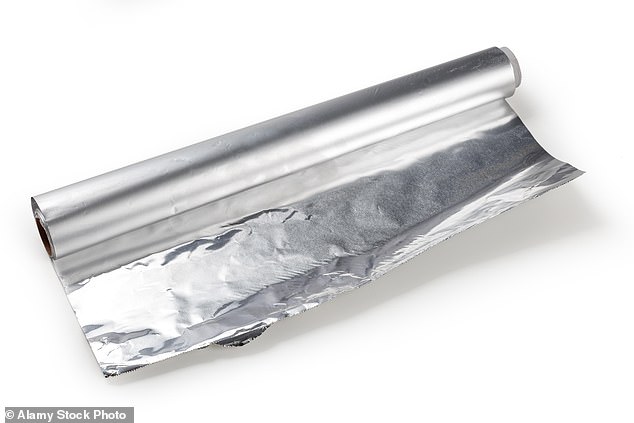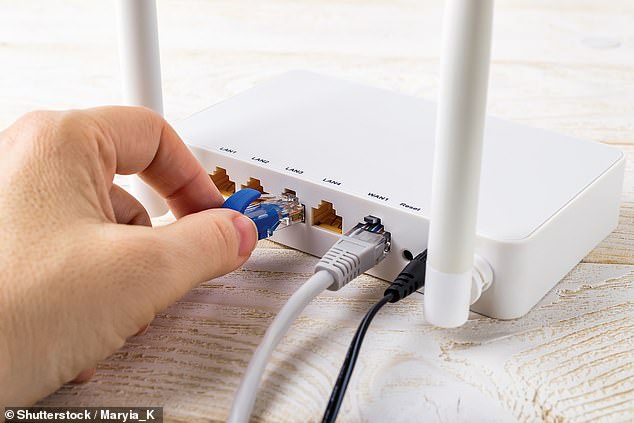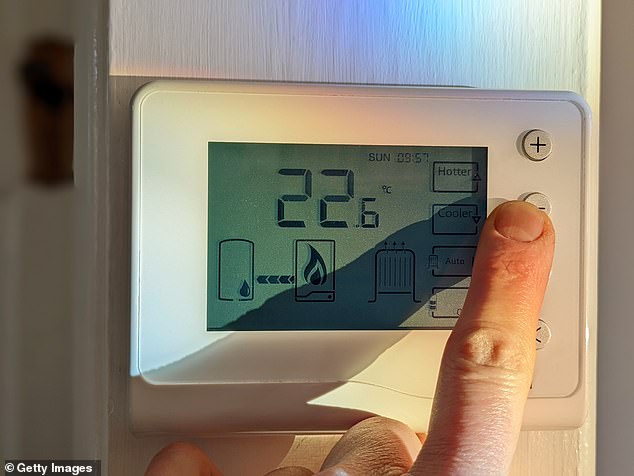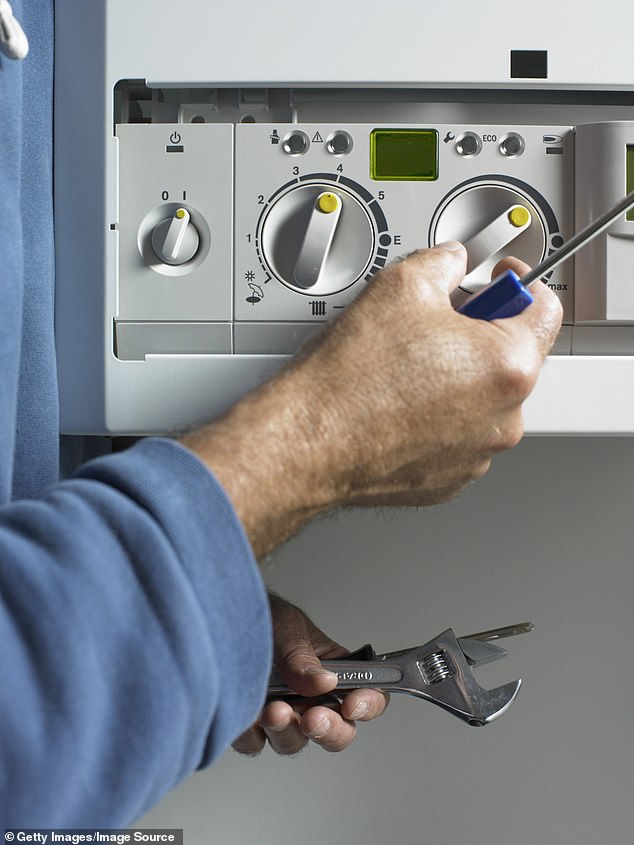Whether you’ve noticed it at the petrol pump or supermarket checkout, the cost of living is soaring.
Add the huge hike in energy prices and it’s no wonder many households are feeling the pinch. With inflation at 9 per cent and likely to reach double figures later in the year, the truth is there could be far worse to come.
Which is why it’s more important than ever to tighten your belt, and that is where I come in. In Saturday’s Mail I told how I pulled myself out of debt. Today, starting a week-long series, I offer my top tips for making savings.
ACT NOW TO TRIM HOME ENERGY COSTS
Rising wholesale gas costs pushed up the energy price cap by 54pc in April, and it is set to rise further in October. This means unless you locked into a fixed-rate tariff before the crisis, your energy bills will soar.
With cheap fixed deals no longer available, it is best to stay put for now. But there are still ways to keep the cost in check.

It has become more important than ever to tighten your belt as the cost of living crisis hits Bitons

Whether you’ve noticed it at the petrol pump or supermarket checkout, the cost of living is soaring
Submit meter readings regularly to ensure you are not paying over the odds. Without these your supplier will estimate bills based on how much power it thinks you use.
If you have been reducing energy usage, you must provide up-to-date readings to benefit from any savings. And keep the direct debits going. If you cancel these and pay when the bill arrives you stand to lose any discounts.
If you think your direct debit is too high, challenge it — some providers have come under fire recently for unjustified bill hikes. You may be able to save money by foregoing paper statements and managing your account online. It’s worth investigating.
ASK FOR HELP IF YOU NEED IT
Anyone struggling to pay their bills should ask their supplier for help. British Gas, for example, has a £6 million fund that gives up to £750 in grants to vulnerable households.
Millions also qualify for the warm home discount and winter fuel payment, worth £140 and up to £300 a year respectively. These are paid automatically if you claim certain benefits. Some on low incomes may need to apply.
RESIST SWITCHING ON THE OVEN
Save hundreds in a year by a using smaller, cheaper appliances instead of the oven.
The Remoska, a mini oven that you plug in, cooks meat, fish, cakes, potatoes and more. Costing between £149.99-£199.99 at Lakeland, many users say they no longer need to use their main oven, which uses 80 pc more energy.
A microwave is also more cost efficient. According to uSwitch, it costs 27p to cook a baked potato in an oven, yet 3p in a microwave.

changing habits will have the biggest impact. Cutting your shower time from ten to four minutes will mean a saving of about £70 a year for the average household
And air-frying food is not only healthier, it costs far less. A cooking time of 40 minutes in an oven takes just 15 minutes in an air fryer and costs 22p less.
They’re not costly, starting at £35 for a Tower Air Fryer at Wilko.
TURN DOWN THE HEATING
Boiler maker Worcester Bosch says turning down the thermostat by one degree saves £105 a year.
Keep heat in by hanging curtains over doors and stop draughts with rolled-up towels. On chilly evenings, have a jumper and blankets handy while watching TV rather than switching the heating on, or just bring your duvet downstairs. It’s a cheaper way to stay warm.
KITCHEN FOIL AT THE READY
If you have radiators against outside walls, put foil behind them to stop heat escaping through the bricks.
Ordinary kitchen foil will do, or buy 10m of radiator foil from B&Q for £12.56. If you do this, you can turn down the thermostat a little and not feel any colder.
Filling in tiny gaps around windows to stop heat escaping and you will save £45 a year on bills.
SWAP OVER YOUR BOILER IN SUMMER
Upgrade your boiler in the warmer months when there’s less competition for plumbers and there are offers on appliances.
Swapping a G-rated boiler to a more sustainable A-rated model working at 90 pc more efficiency could save you £580 a year, says Worcester Bosch.

Upgrade your boiler in the warmer months when there’s less competition for plumbers and there are offers on appliances
There are also 0 pc finance deals on boilers at this time from firms like British Gas and E.on.
TRY A HEATED CLOTHES DRYER
IF you afford the initial outlay, heated clothes airers are relatively cheap to run. They also take the chill off your room while drying you clothes.
The Dry-Soon 3-Tier Heated Airer from Lakeland costs £149.99 but costs pennies per hour to run.
A tumble dryer, though, costs about £223 a year to dry three loads each week, says Uswitch.com.
SAVE ON CLEANING PRODUCTS
Is your kitchen full of half-used cleaning products? Have a moratorium on buying more.
When you do come to replace these, save money by using white vinegar and newspaper for windows, and a mix of vinegar and bicarbonate of soda as an all-purpose cleaner. This costs about 9 p a litre.
Find more cleaning products to make at friendsoftheearth.uk.
KITCHEN AT A DISCOUNT
Want to update your kitchen? If you’re willing to buy second-hand or ex-display units instead of brand new, you could save thousands. Try theusedkitchencompany.com.
You could get an entire £2,500 ex-display kitchen for as little as £300 online. Kitchens can cost a few hundred on eBay or Gumtree from people selling their old one.
SHOP SMART TO EAT WELL FOR LESS
Food and drink costs soared by 5.9 pc in March, the highest in the previous ten years, according to the Office for National Statistics.
And it’s set to rise further, with the possibility of shortages soon.
Shop for cheaper food online. See cheapfood.co.uk and approvedfood.co.uk for basics that are often close to their ‘best before’ date.
Try less expensive cuts of meat such as pork belly and braising steak. Turkey is relatively cheap, too. Bulk up mince with beans and lentils to make it go further.
Replacing one meat meal with a veggie one once a week can save you at least £30 a month.
Use online vouchers for restaurants such as Pizza Express. Others like Gourmet Burger Kitchen and Wagamama have clubs that can save you money. And try vouchercodes.co.uk, hotukdeals.com, Groupon and Wowcher.
BAG A BETTER BROADBAND DEAL
With broadband, landline and TV bundles, avoid the loyalty trap. Many providers save the best deals for new customers. You can save £48 a year by switching — £96 if TV is included, according to Which?
Don’t be seduced by an offer for free gadgets or vouchers if there is a better financial deal elsewhere.
Use comparison websites such as Uswitch and Comparethemarket to find the best deals. But before switching, call your existing provider. It might offer lower prices to persuade you to stay.
If you are midway through a contract watch out for exit fees, though some providers will offer cash towards these if you switch.
Anyone on universal credit, pension credit or income support may qualify for a ‘social tariff’. Ofcom estimates 4.2 million households are eligible for these (up to £30 cheaper per month).
SHAVE £300 OFF MOBILE PHONE BILLS
Check your data. Consumer watchdog Which? says casual phone users are being sold contracts with big data allowances. It estimates you could save more than £300 a year by choosing a smaller amount.
Also check you are on the right rate. Millions are paying over the odds for mobiles because their contract has ended, so they are still paying for a handset they already own.

If you are midway through a contract watch out for exit fees, though some providers will offer cash towards these if you switch
Your provider should notify you when you are out of contract so you only pay for the minutes and data used. You will not be switched to a cheaper deal automatically. If happy with your phone, save by switching to a Sim-only contract rather than upgrading to a new handset.
GiffGaff, Tesco Mobile or Smarty offer unlimited texts and calls and different levels of data from as little as £3.98 a month.
To save your minutes, make calls over the internet, using WhatsApp or Skype.
CASH IN ON TV FREEBIES
The golden rule for television packages is simple: don’t pay for what you’re not watching. Check your statements to see if you’re paying for services you’re not using. With ‘one click’ subscriptions, it’s easy to sign up for things that start free then cost a small amount each month after.
Netflix’s basic package is £4 cheaper a month than the standard option, for example, and may be all you need.
Also take advantage of any free trials. Amazon Prime is offering 30 days free. Apple TV+ and Britbox offer seven days. Just be sure to cancel before any money is taken. Or stick to free services like Freeview and YouTube.
REDUCE YOUR WATER BILLS
You can’t change suppliers but you can ensure that you’re not overpaying.
In England and Wales, there are two ways to calculate your water bill: as a household estimate or according to a water meter.
If your household has more bedrooms than occupants consider a meter as an estimate may be higher than actual usage. And ask your provider for any free water-saving devices.
But changing habits will have the biggest impact. Cutting your shower time from ten to four minutes will mean a saving of about £70 a year for the average household. The Energy Saving Trust says a more efficient shower head could save you £120 a year.
CLEVER WAYS TO GET CHEAPER PREMIUMS
If possible, pay your home and car insurance annually rather than in monthly instalments, as insurers add interest to the latter, typically 5 pc to 10 pc APR. On a £200 policy at 10 pc, you could save £20 paying upfront.

We have a weekly Sainsbury’s delivery, paying £5 for an hourly slot. By changing to the saver slots — which have a four-hour window — I can save £208 a year and, as my husband and I now both work from home, it’s convenient
You can also get cheaper premiums by increasing the voluntary excess — the contribution you’d have to make if you claim.
Ditch any extras you don’t need, such as legal expenses or accidental damage and don’t double up on cover you already have. If you have a premium bank account, this might include travel insurance, for example.
Comparison websites recommend thinking carefully about how to describe your occupation (ie ‘illustrator’ rather than ‘artist’) and consider adding a more experienced driver to your policy to cut costs. But remember, being dishonest on an insurance application is fraudulent and would render any policy invalid.
GET A REBATE ON YOUR COUNCIL TAX
To cushion the impact of rising energy bills, the Treasury has pledged a £150 council tax rebate for homes in bands A, B, C or D. This will arrive automatically by September if you pay by direct debit. If you pay by cash or cheque, your council should contact you to arrange payment.
The Treasury has also set aside £144 million to help households in higher bands who are struggling. Ask your council how to apply. If you’re struggling to pay for essentials, councils may offer a ‘discretionary reduction’.
The Citizens Advice website lists other schemes that can reduce council tax bills, like discounts for single person households, for live-in carers or low-income households.
How I saved £5,000 a year with a few phone calls: One writer sets about slashing her household expenses with some switching and haggling
BY RUTH EMERY FOR THE DAILY MAIL
My husband and I like to think we’re quite savvy with our money. We use comparison sites to find the cheapest insurance policies, and I can often be seen hunting for ‘yellow sticker’ items in the supermarket.
But like many families, we’ve been alarmed by the rising cost of our weekly shop, and our astronomical energy bill. Our household budget has come under pressure from every side: from filling up our Seat Leon to the 20 pc price hike at our local fish and chip shop.
It’s not possible to switch our energy bill right now as there are no competitive deals and we moved our broadband, car and home insurance recently, so I know those are in safe hands.
I set myself a challenge to reduce our other outgoings with some clever switching and haggling.

Our household budget has come under pressure from every side: from filling up our Seat Leon to the 20 pc price hike at our local fish and chip shop
MORTGAGE
Our lender sent a letter reminding us that our fixed rate is ending soon. I check what rate we’d fall on to if we did nothing. Gasp! The answer is 4.24 pc. Our current rate is 1.26 pc.
I ring mortgage broker London & Country (L&C) for advice. As well as searching the market, it recommends checking what rates our lender is offering, as it often has deals for existing customers. Two options come up: a 2.34 pc two-year fixed rate, and a 2.16 pc five-year fix.
The five-year rate — which is £1,432 a month — feels competitive in today’s climate and we make the switch.
Before: £1,770 a month
After: £1,432 a month
Annual saving: £4,056

But like many families, we’ve been alarmed by the rising cost of our weekly shop, and our astronomical energy bill
BANK ACCOUNT
Our Nationwide FlexPlus joint account costs £13 a month. We took it out years ago as it was offering 3 pc interest, plus free travel insurance and breakdown cover.
However, it scrapped the interest in 2019 and are the ‘perks’ a saving? For starters, I find I can get cheaper annual travel insurance by buying it directly (I used comparison sites Moneysupermarket.com and Uswitch.com to find the best deal — £27.20 for a year).
After spotting there’s a £175 bonus if you transfer to the HSBC Advance Account, I make the switch.
Before: £156 a year
After: £42.54 a year (for travel insurance/breakdown cover)
Annual saving: £288.46 (includes £175 switching bonus)
FOOD DELIVERY
We have a weekly Sainsbury’s delivery, paying £5 for an hourly slot. By changing to the saver slots — which have a four-hour window — I can save £208 a year and, as my husband and I now both work from home, it’s convenient.
By taking up free delivery offers from time to time from Ocado and Iceland, I can make further savings pushing the annual total saved up to £220.
Before: £260
After: £40
Annual saving: £220

By taking up free delivery offers from time to time from Ocado and Iceland, I can make further savings pushing the annual total saved up to £220
TV SERVICES
Netflix has become an integral part of our life but do we also need Disney+ and Amazon Prime? I call Netflix to try to haggle on the price — we’re on the basic plan, costing £6.99 a month — to no avail.
So I cancel my Amazon subscription, saving £7.99 a month. For Disney+ (also £7.99 a month), you can use £8 of Tesco Clubcard vouchers to buy a six-month subscription. So I cancel our contract and will save up my Clubcard vouchers to get it again in future.
Before: £275.64
After: £83.88
Annual saving: £191.76
GYM MEMBERSHIP
For £45 a month, I can use the gym, indoor pool, lido and attend classes at my local leisure centre.
Can I cut the price? I go to ask in person and the receptionist explains I can switch to the £34 membership. This doesn’t include classes but, as I tend to only use the gym and lido, that’s fine.
I can also get a month free by recommending a friend, so I message a pal who agrees.
Before: £45 a month
After: £34 a month
Annual saving: £166 (including the one free month)
MOBILE PHONE
My Sim-only mobile deal is already a bargain: for £10.92 a month, I get unlimited minutes and texts, and 10GB of data. However, O2 has announced it’s raising tariffs by 7.8 pc to reflect inflation, so my bill (including VAT) is about to jump to £11.63.
Can I beat the hike? When I call, I’m put on hold for nine minutes before I get through. Eventually, I’m offered a £10 deal for 6GB of data. I generally only use 2GB of my 10GB data each month, so I accept the offer.
It may only be a £1.63 saving, but the 14 pc reduction wipes out the inflationary rise and saves me a few pennies on top.
Before: £11.63 a month
After: £10 a month
Annual saving: £19.56
GRAND TOTAL: £4,941.78



